- Home
- Nathan Lowell
Double Share: Solar Clipper Trader Tales Page 9
Double Share: Solar Clipper Trader Tales Read online
Page 9
That didn’t make me feel any better about getting underway, but I was too far down the rabbit hole to back out.
As I finished getting my coffee, I saw Mr. Burnside lean over to the captain and say something. His eyes flickered in my direction. The captain turned his head and stared straight at me, his brow wrinkling in a full on scowl. I kept my face down, pretending not to notice that I was the subject of his scrutiny, then slowly worked my way toward my place at the table.
I hadn’t made it all the way before the captain spoke loudly. He didn’t really need to. The wardroom was small, and there were only the six of us in it.
“Well, now that our junior man has seen fit to join us, I think we can begin,” he announced and took his seat at the head of the table.
Mr. Burnside sat on the captain’s right while Ms. Menas sat on his left. Beside her, Ms. DeGrut took her seat and beside her, a slender man with cook’s insignia took the third chair on that side. Ms. Novea flashed me a quick smile as she sat next to Mr. Burnside, making sure to leave him plenty of room by sliding the chair ever so subtly away from him. I took the last seat, across from the cook.
“Right then,” the captain said. “You know the drill, let’s get this over with. Menas?”
“All tanks are full. Batteries are charged. Fusactors are hot and the sail and keel generators are on safety standby. Surplus waste has been removed according to standing orders and the regulations of the base. The ship’s engineering division is ready to get underway, Captain,” she replied without looking at him or varying her inflection one iota. She sounded a bit like a robot.
“DeGrut?” the captain asked.
“Cargo pod locked and checked. The embargo seals were verified at 09:00 according to port regulations and standing orders. Cargo manifest and mass ratings are on file in ship’s systems, correlated against station records and tested using the required metrics for accuracy. The ship’s cargo division is ready to get underway, Captain,” she said, just as flatly as Ms. Menas.
“Vorhees?” the captain barked again.
“Ship’s stores of fresh, frozen, and packaged food stuffs have been inventoried and cross checked. Expiration dates on all food stuffs have been checked and are within the parameters established by rule, regulation, and common practice. The ship’s steward division is ready to get underway, Captain,” the man across from me reported crisply.
“Wang?” the captain said. He pronounced it with an “a” sound rhyming with pang instead of the correct “o” sound, rhyming with gong.
“Ship’s systems have been checked, updated, patched and validated according to CPJCT regulations and local station rules. Communications queues have been flushed in preparation for getting underway and last-port-backup is running according to established custom and standing order. Systems section of the deck division is ready to get underway, Captain,” I rattled off.
The captain stared at me for a moment. He glanced at Mr. Burnside with a small frown before barking, “Novea?”
“Ship’s astrogation sensors have been collimated and resolution is within CPJCT tolerances. Databases are up to date and verified against station reference. Chart corrections completed. Standard course for Breakall has been plotted, verified for ship’s mass, and filed with Port Authority according to established rules and customs. There are no ATON warnings outstanding for our projected course. We are cleared to undock at ship’s discretion at or about 13:30 hours this date. Astrogation section of the deck division is ready to get underway, Captain.”
“Mr. Burnside?” the captain said.
“All hands present or accounted for. All ship’s systems are reported space worthy and the required forms and procedures have been filed and followed. We have cargo and are cleared for Breakall according to CPJCT rules and regulations governing ships of our class and size. The ship is ready to get underway, Captain.”
“Thank you, everyone,” the captain said. With the formalities over he looked around the table. “Mr. Vorhees? Can you do anything about the coffee?” he asked with a grin on his face.
Vorhees smiled at what was, apparently, a long standing point of contention.
“There’s naught wrong with the coffee, Captain. It’s dark. It’s strong. It’s bitter. It’s plentiful. What more could you ask?” he said.
The captain turned his gaze to me, then and said, “We have a new member in our merry band. Welcome, Mr. Wang. Would you be so kind as to report to my cabin after we secure from navigation detail?”
“Aye, aye, Captain,” I replied.
While it’s common for a captain to talk about “my ship,” even when the hull belongs to somebody else, it’s really verbal shorthand for “my command” and nobody thinks too much about it. But when Rossett referred to “my cabin,” it jarred me. Every ship I’d ever been on had only one compartment designated as “the cabin.” The captain used it as a combination living quarters, office, meeting room, and—sometimes—courtroom, but it belonged to the ship much the same way as “the main lock” or “the ship’s office.” Hearing Rossett take such a proprietary view spoke volumes, and I knew right then that Captain Leon Rossett was not the kind of person I had been used to sailing with.
The captain turned to Mr. Burnside and said, “My goodness, he’s a nautical little devil, isn’t he, David.”
“Mr. Wang is full of surprises, Captain,” Mr. Burnside replied.
“I’m sure he is,” the captain said, his eyes tracking back to me. His lips curled into a frightening approximation of a smile. “I’m sure he is.”
The silence lasted for about three very long heartbeats before the captain slapped the table with his right hand as if bringing down a gavel. “Good! Company dismissed to final preparations for navigation detail at 13:30”
The chairs all scraped as everybody stood. The captain said, “David? A moment, please.” The rest of us filed out of the wardroom without another word.
I dropped my used cup in the tray on the sideboard as I walked out, and Arletta Novea caught up with me on the way to the bridge to check my backups.
“Nice job on the report,” she said. “They expected to trip you up.”
“I figured as much,” I said with a quiet snort.
“How did you know?” she asked.
I just looked at her. “It’s standard procedure. It’s written up in the standing orders. They just didn’t think I’d had time to read them.”
“When did you?” she asked curious.
“I haven’t yet,” I admitted.
“Then—?” she stopped in mid sentence, confused.
We’d reached the ladder up to the bridge by then. “Easy, I had three reports to go by before he got to me. Each was logical, succinct, and all used the same formulaic language. All I did was walk through the various items I know I’m responsible for, threw in some of the boilerplate verbiage, and said we were ready to go. They have no idea what I’m supposed to report and I’ll bet that when I do get to the standing orders they only say something about getting underway after the appropriate section and division have been given.”
“You bluffed?” she asked with a laugh almost bubbling up.
“Well, not really bluffed. I just figured I stood a better chance by giving a complete report than by sitting there and saying I didn’t know what they wanted.”
She laughed then, the first laugh I’d heard aboard. “This is gonna be an interesting trip. A very interesting trip.”
She turned and scampered up the ladder ahead of me and I couldn’t help but notice certain aspects of her personality that I found quite appealing.
She had a very nice laugh.
CHAPTER FOURTEEN
DIURNIA ORBITAL
2358-JULY-8
Lunch in the wardroom was strained. The captain presided from the head of the table. Mr. Burnside had taken the first section OOD watch at noon and left me at loose ends. All through the meal, whenever the captain would look at my end of the table, he had a frown. I remembered Captain Giggone�
��s unhappiness when the company put a new crewman on her ship when she wasn’t expecting it. The situations weren’t identical. I wasn’t replacing an existing third mate but filling an empty berth.
The whole thing made my head hurt. What should it matter?
Mercifully, the lunch was brief. Davies served very competently. She was one of the few crew members I had ever seen who wasn’t wearing a dirty shipsuit. With six of us at table, she moved sharply to get us all served and then circulated around, keeping coffee and water topped off. Mr. Burnside did not repeat his inappropriate behavior, and I began to wonder if I’d imagined it. Perhaps I’d seen something that my eyes misinterpreted because of the angle. Davies hadn’t reacted at the time and she looked no more concerned now.
At 13:15 the captain dismissed the mess, and we all trouped up to the bridge. I was last out of the room, of course, and took a moment to put my dishes in the tray. Davies, who was already starting to clear the board looked startled, but said a demure, “Thank you, sar. That’s not necessary.”
I smiled and shrugged.
“Old habits, Ms. Davies. I used to be a messman apprentice myself,” I said and followed the other officers to the bridge.
There was, I confess, a certain frisson of excitement in getting underway as a real third mate. It’s not like I hadn’t done it a dozen times already as a cadet, but this time I was getting paid for it. That shouldn’t have made a difference, but it did. This wasn’t a station on loan to me for the purposes of the exercise. This was my station, my ship. For perhaps the first time since coming aboard, that idea had begun to sink in.
The captain took his seat in the command chair and nodded to Mr. Burnside.
Mr. Burnside said, “Call navigation stations, Mr. Mallory.”
Mallory spoke softly into the ship’s intercom and I knew speakers around the ship would be calling crew to quarters. The bridge crew looked to be in place already. Ms. Novea sat at astrogation with Ms. De Silva. Ms. Menas had the main engineering station and my systems console showed another station slaved to hers which was probably in the after engine room.
“Take us out, Mr. Burnside,” the captain said.
“Aye, Captain,” Mr. Burnside replied. “Astrogation, clear us with the orbital. Mr. Mallory, signal the tugs, if you would?”
Mallory spoke into his mic and I saw the tugs lashing onto our systems in a coordinated maneuver. The familiar schematic of ship and systems expanded to include the two tugs outboard from the orbital.
Mr. Burnside waited for a tick and added, “Prepare for pullout, Mr. Mallory.”
Mallory spoke into his headset again, but loudly enough for the bridge to hear. “Secure forward locks. Make ready for pull out. Disable docking clamp interlocks.”
I saw the repeater on my console as the docking clamps went from the red indicating locked to green showing that they were ready to release.
Mallory’s voice came almost immediately, “Locks secure. Docking clamps are green. The ship’s board is green once, sar.”
Mr. Burnside asked, “Astrogation?”
Ms. Novea answered, “Astrogation online and running. Ship’s board is green twice.”
I scanned my boards one last time as Mr. Burnside said, “Systems?”
“Systems are online and running. Ship’s board is green thrice,” I completed the formula.
Mr. Burnside turned to the captain and said formally, “All boards are green and the ship reports ready for departure at 13:30, Captain.”
The captain said, “Log it, Mr. Burnside.”
Mallory’s voice came back with, “Logged, sar.”
“Make the announcement, Mr. Mallory,” Mr. Burnside said crisply. “Stand by for pullout in ten.”
As Mallory gave his announcement and the countdown, I could sense the others around me, getting ready for what should be an anticlimax but which sometimes was a bit more exciting. The tugs took up the strain on the ship as the countdown got to “three”—not pulling but keeping the ship steady. At “zero” the clamps went from green to red again as they released and I felt, as much as heard, the familiar clunk from the bow as the ship came loose from the station.
“Clamps released,” Mallory confirmed.
“Back dead slow,” Mr. Burnside ordered.
“Back dead slow, aye,” Mallory confirmed and the tugs increased their pull ever so gently as the side of the orbital slipped away from the forward ports. I felt the ship move under me for just a moment before the inertial dampeners kicked in.
The tugs did their job, helping to maneuver the heavy vessel back from the fragile orbital. Carrying as much mass as we did, it would not have taken much to damage the station fatally. While we drifted backward, I watched the systems data flows. The Tinker was considerably shorter than the Lois McKendrick at only a hundred and forty meters. The bar bell design made up for the difference in length by making the ship twice as wide. In cross section the ship was roughly hexagonal which made for short, but wide decks in the fore and aft sections. In spite of the difference in length, the ship was rated at two hundred metric kilotons, or nearly five times the cargo capacity of the McKendrick. The Burleson drives were huge Victor-class models which gave the ship a jump range of four BUs fully loaded. The ship was basically one big cargo hold with engineering and crew spaces strapped to each end. From a design standpoint, it was as subtle as a brick.
The systems data flows were all nominal and the pullback went smoothly. As we came up on the departure position, Mr. Burnside announced, “On station for getting underway, Captain.”
“Log it,” the captain said. “Bring us about and let’s get this show on the road.”
“Aye, Captain. Log departure at 2358-July-8 14:05,” Mr. Burnside ordered.
Mallory confirmed with a brisk, “Aye, aye. Departure logged at 2358-July-8, 14:05, sar.”
“Release tugs with our respects. Engines all stop. Prepare to come about.”
Mallory signaled the tugs and I saw them release us smoothly and the systems readouts confirmed the engines had stopped.
“Tugs released. Engines are stopped, sar. Ready to come about,” Mallory announced.
“Astrogation, bring us around. Engines ahead one quarter.”
Ms. Novea replied, “Thrusters maneuvering to bring us onto departure vector.”
The station swung out of our forward view and I saw the two tugs heading back into dock as they slid by.
“Engines ahead one quarter, aye, sar,” Mallory confirmed.
We began the long climb up out of Diurnia’s gravity well. In another stan, Ms. Menas started winding up the sail and keel generators and by 15:30, the ship was clear of local traffic.
“Shake out the reefs,” Mr. Burnside ordered and I watched the huge sails billow on my systems display.
Nothing actually showed in visible light. It was one of my great disappointments. The sails and keel were insubstantial force fields, driven by sail and keel generators in the fore and aft sections. They were invisible to the naked eye, but to the various field sensors, they showed as huge panels against the background radiation of the universe. The main sail extended some twenty kilometers and was configured to catch the solar wind from almost directly astern as we pulled up and away from Diurnia’s primary. We were climbing up, perpendicular to the plane of the ecliptic to carve the shortest path to the Burleson limit as possible. Even so, it would be five weeks before we’d be far enough out to fire up the drives and bend space-time. Once the Burleson drives had given us our little hole in space, we’d be another five weeks clawing our way back down into the Breakall System.
Ten weeks in space, more or less, then we’d get four days in port. On the Lois, that hadn’t seemed like such a big deal. I had an uneasy feeling as I watched Diurnia Orbital fall away that ten weeks on the William Tinker might be a life time.
“We’re underway, Captain,” Mr. Burnside announced.
“Very well. Secure from navigation detail. Set the watch,” the captain replied.
> “Please make the announcement, Mr. Mallory,” Mr. Burnside ordered. “First section has the watch.”
“Aye, sar, first section has the watch,” Mallory replied.
As he made the announcement a few people swapped places on the bridge, and I watched the ship’s status monitors shift.
The captain stood then and headed for the ladder. “Mr. Wang, at your convenience,” he reminded me before descending from the bridge.
“Aye, Captain,” I replied to the empty spot where he wasn’t waiting for my acknowledgment.
I secured my console after one more—very fast—review of ship’s systems. As I crossed the bridge, I checked my tablet to verify that it was slaved to the console so I’d be notified where ever I was on the ship if anything threw an alarm.
Arletta gave me a smile as I walked past her station, but Mel looked grim as she watched me drop down off the bridge and head for the cabin.
As in most ships, the cabin was just down the passage from the bridge. The rest of Officers’ Country was only slightly farther. In the crowded confines of the Tinker, that distance wasn’t far at all.
I knocked on the door and heard, “Come in, Mr. Wang,” from the other side.
I entered and stopped just inside the door. “Third Mate Ishmael Wang, reporting as ordered, Captain,” I said bracing formally.
It wasn’t the first time I’d been called to the cabin by a captain. It was one drill I knew pretty well.
“Come in, Mr. Wang. Have a seat,” the captain replied, releasing me from formality with a wave of his hand to a side chair. He still mispronounced my name, in spite of having heard me say it.
“Thank you, Captain,” I said and took the offered chair.

 By Darkness Forged (Seeker's Tales from the Golden Age of the Solar Clipper Book 3)
By Darkness Forged (Seeker's Tales from the Golden Age of the Solar Clipper Book 3)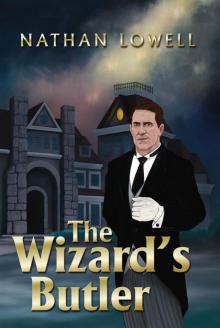 The Wizard's Butler
The Wizard's Butler Cape Grace
Cape Grace By Darkness Forged
By Darkness Forged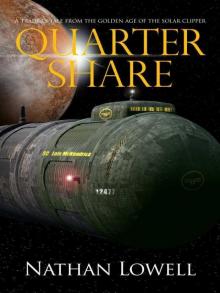 Quarter Share
Quarter Share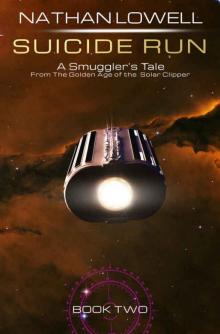 Suicide Run (Smuggler's Tales From the Golden Age of the Solar Clipper Book 2)
Suicide Run (Smuggler's Tales From the Golden Age of the Solar Clipper Book 2)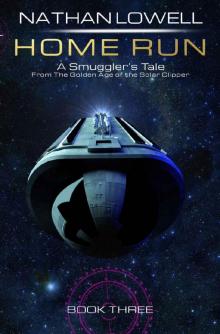 Home Run (Smuggler's Tales From the Golden Age of the Solar Clipper Book 3)
Home Run (Smuggler's Tales From the Golden Age of the Solar Clipper Book 3)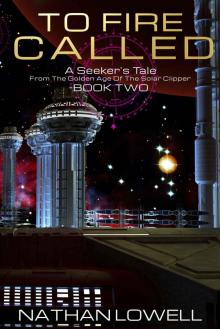 To Fire Called (A Seeker's Tale From The Golden Age Of The Solar Clipper Book 2)
To Fire Called (A Seeker's Tale From The Golden Age Of The Solar Clipper Book 2)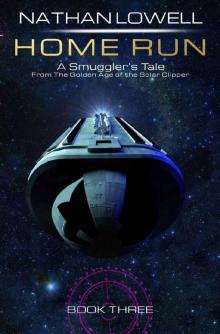 Home Run
Home Run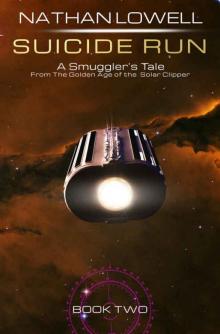 Suicide Run
Suicide Run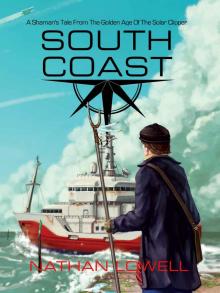 South Coast (Shaman's Tales From The Golden Age Of The Solar Clipper Book 1)
South Coast (Shaman's Tales From The Golden Age Of The Solar Clipper Book 1)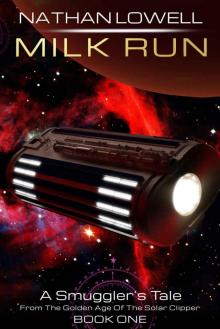 Milk Run (Smuggler's Tales From The Golden Age Of The Solar Clipper Book 1)
Milk Run (Smuggler's Tales From The Golden Age Of The Solar Clipper Book 1) Ravenwood (Tanyth Fairport Adventures)
Ravenwood (Tanyth Fairport Adventures) Captain's Share (Trader's Tales from the Golden Age of the Solar Clipper)
Captain's Share (Trader's Tales from the Golden Age of the Solar Clipper) Owner's Share (Trader's Tales from the Golden Age of the Solar Clipper)
Owner's Share (Trader's Tales from the Golden Age of the Solar Clipper) Half Share
Half Share The Hermit of Lammas Wood
The Hermit of Lammas Wood Ravenwood
Ravenwood Full Share
Full Share A Light In The Dark (Tales of the Deep Dark)
A Light In The Dark (Tales of the Deep Dark) In Ashes Born (A Seeker's Tale From The Golden Age Of The Solar Clipper Book 1)
In Ashes Born (A Seeker's Tale From The Golden Age Of The Solar Clipper Book 1)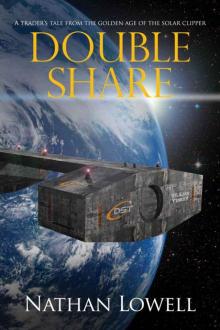 Double Share: Solar Clipper Trader Tales
Double Share: Solar Clipper Trader Tales Zypheria's Call (A Tanyth Fairport Adventure)
Zypheria's Call (A Tanyth Fairport Adventure)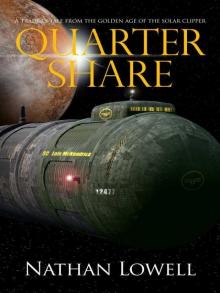 Quarter Share attftgaotsc-1
Quarter Share attftgaotsc-1